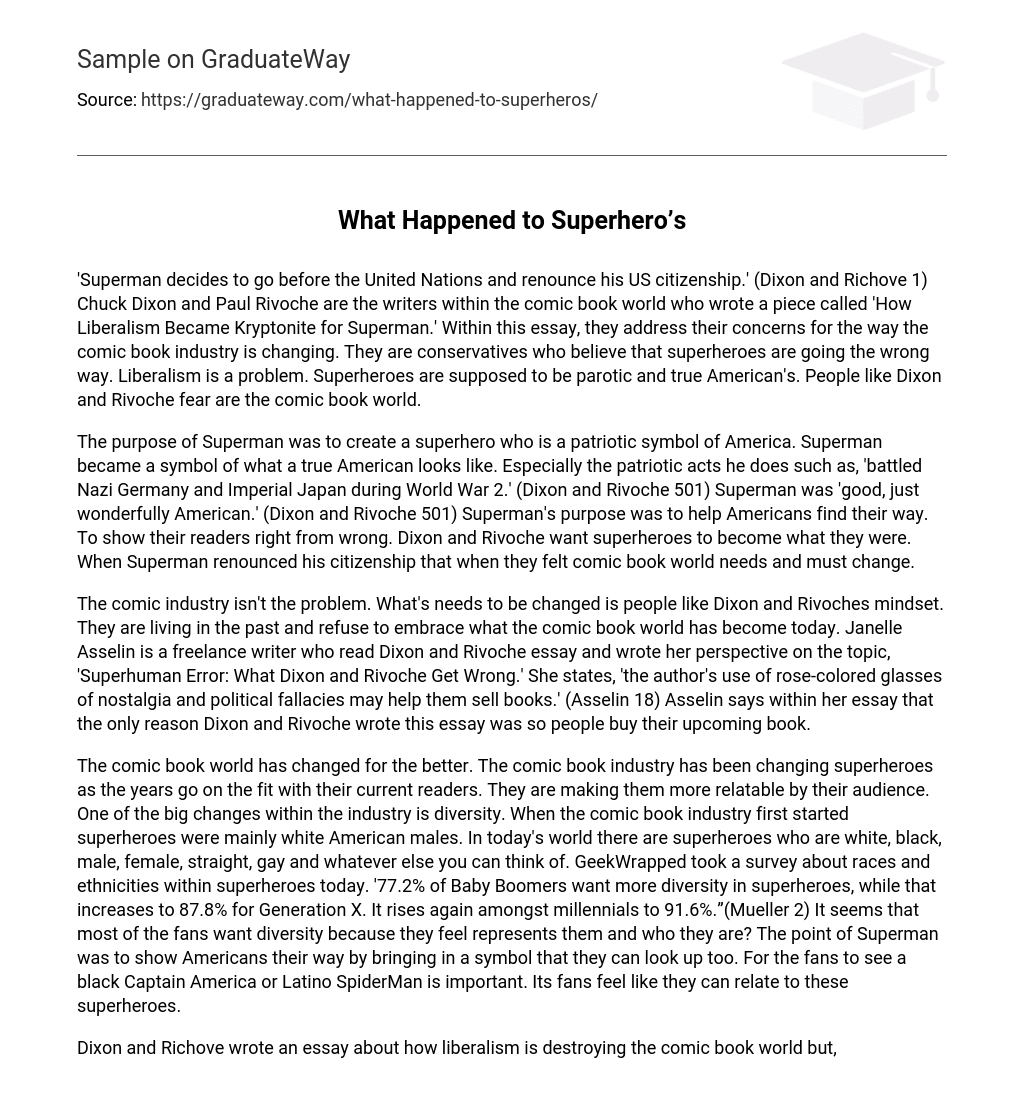Dixon and Richove express their concerns about the changing comic book industry in their essay “How Liberalism Became Kryptonite for Superman.” They argue that superheroes are deviating from their patriotic and American values, which they believe should be upheld. One example they give is when Superman renounces his US citizenship before the United Nations (1). Dixon and Rivoche, who are conservatives, find this shift towards liberalism troubling and worry about its impact on the comic book world.
The purpose of Superman was to create a superhero who embodies patriotism and serves as a symbol of America. Superman became an embodiment of the ideal American, performing patriotic acts such as fighting against Nazi Germany and Imperial Japan during World War 2 (Dixon and Rivoche 501). He was regarded as a beacon of goodness, representing the American values (Dixon and Rivoche 501). Superman’s purpose was to guide Americans and demonstrate the difference between right and wrong. Dixon and Rivoche advocate for superheroes to return to their original essence. Their call for change in the comic book world arose when Superman rejected his citizenship.
The comic industry is not the issue. What needs to change is the mindset of individuals like Dixon and Rivoche, who are stuck in the past and resistant to accepting the current state of the comic book world. Janelle Asselin is a freelance writer who reviewed Dixon and Rivoche’s essay and expressed her viewpoint on the subject in her own article titled ‘Superhuman Error: What Dixon and Rivoche Get Wrong.’ According to Asselin, the authors’ reliance on nostalgia and political fallacies may be a ploy to boost book sales (Asselin 18). Asselin asserts in her essay that Dixon and Rivoche’s sole motivation for writing this piece was to generate interest in their forthcoming book.
In recent years, the comic book industry has witnessed positive changes as superheroes have been modified to better connect with and resonate with current readers. One notable change is the inclusion of diversity, which was lacking in the past when superheroes were predominantly white American males. Today’s heroes, on the other hand, come from a variety of backgrounds including different races, genders, sexual orientations, and more. According to a survey conducted by GeekWrapped on racial and ethnic representation in superheroes, 77.2% of Baby Boomers expressed their desire for greater diversity in these characters. This percentage rises to 87.8% for Generation X and further increases to 91.6% among millennials (Mueller 2). These findings highlight the fact that fans yearn for diversity because it reflects their own identities. Initially created as a symbol for Americans to admire, Superman has now become significant for fans who require heroes like Black Captain America or Latino SpiderMan in order to establish a connection and identify with them.
Dixon and Richove published an essay discussing the impact of liberalism on the comic book industry, contending that while it may have detrimental effects, it has also fostered a deeper connection between readers and superheroes. The creation of Superman aimed to guide Americans, a mission that remains relevant today. The evolution of the comic book realm mirrors that of its readers, who seek increased relatability. A shift in mindset is necessary for Dixon and Rivoches, as they solely strive to restore superheroes to their past glory. However, they fail to acknowledge that superheroes are currently thriving like never before.
Works Cited
- ComicBook. “New Study Reveals Fans Want to See More Diverse Superheroes on Screen.” Marvel, ComicBook.com, 3 July 2018, comicbook.com/marvel/2018/06/30/study-reveals-fans-want-diverse-superheroes-on-screen/.
- Dixon, Chuck, and Paul Rivoche. The Bedford Reader. thirteenth ed., 2016
- Janelle Asselin. The Bedford Reader. thirteenth ed., 2016





